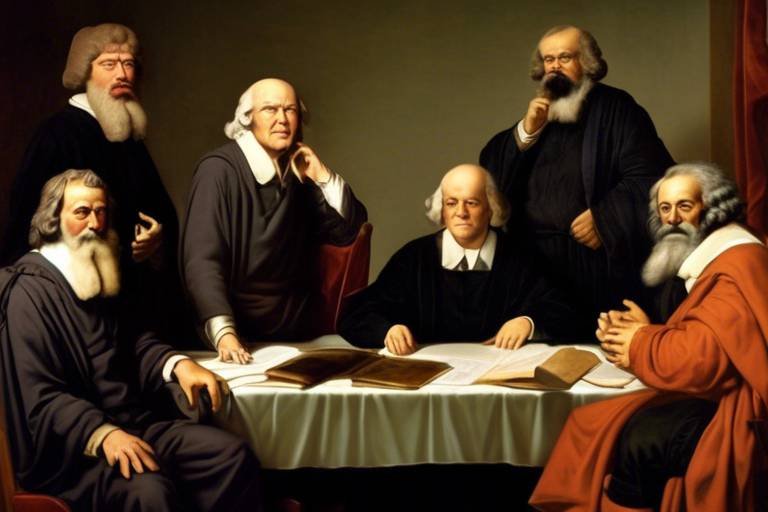Philosophy and the Politics of Patriotism
Patriotism is a concept that resonates deeply within the hearts of individuals, shaping identities and influencing political landscapes. But what exactly is patriotism? Is it merely a blind allegiance to one's country, or does it encompass a deeper philosophical understanding of belonging and responsibility? In this exploration, we will unravel the intricate relationship between philosophical concepts and the political implications of patriotism, examining its impact on identity, governance, and social cohesion.
At its core, patriotism is about love for one's country, but it also invites a plethora of questions that challenge us to think critically about our loyalties. Consider this: how does the affection for our homeland translate into political action? Does it foster unity among citizens, or does it breed division when confronted with differing viewpoints? These questions are fundamental as we navigate through the philosophical underpinnings of patriotism and its role in shaping societal values.
Philosophers throughout history have grappled with the nature of patriotism, offering various perspectives that enrich our understanding. For instance, some argue that true patriotism involves a commitment to the principles of justice and equality that a nation stands for, while others may contend that it is simply an emotional attachment to one's homeland. This dichotomy raises critical ethical considerations: should our love for our country supersede our obligations to humanity at large? In the following sections, we will delve deeper into these theoretical foundations, contrasting patriotism with nationalism, and exploring historical perspectives that have shaped patriotic sentiments across cultures.
As we embark on this journey, it is essential to recognize that patriotism is not a static concept; it evolves with time and context. In an age of globalization, where borders seem to blur and cultures interweave, the notion of what it means to be patriotic is constantly challenged. How do we reconcile a global identity with national pride? This article aims to provide insights into these complex dynamics, shedding light on the ethical dimensions of patriotism and its implications for civic responsibility.
By the end of our exploration, we hope to offer a comprehensive view of how philosophical ideas intertwine with the politics of patriotism, ultimately shaping the fabric of our societies. So, let's dive in and discover the multifaceted nature of patriotism and its profound implications for our world today.
- What is the difference between patriotism and nationalism? Patriotism is generally seen as a love for one's country and a commitment to its values, while nationalism often involves a belief in the superiority of one's nation over others.
- Can patriotism be considered ethical? Yes, many argue that patriotism can be ethical when it aligns with principles of justice and equality, though it can also lead to ethical dilemmas when it conflicts with universal human rights.
- How does globalization affect patriotism? Globalization challenges traditional notions of patriotism by fostering a sense of global interconnectedness, which can dilute national identities and loyalties.

Theoretical Foundations of Patriotism
Understanding the philosophical underpinnings of patriotism is crucial for analyzing its role in society. At its core, patriotism can be defined as a deep-seated love and loyalty to one’s country, often accompanied by a desire to promote its interests and well-being. This emotional attachment can stem from various factors, including shared history, culture, language, and values. Theoretical perspectives on patriotism vary widely, influencing how it is perceived and practiced across different societies.
One of the foundational theories of patriotism is the social contract theory, which suggests that individuals consent, either explicitly or implicitly, to form a society and abide by its rules in exchange for protection and benefits. Think of it as a mutual agreement where citizens pledge allegiance to their nation, while the state, in turn, promises to safeguard their rights and freedoms. This reciprocal relationship underscores the ethical dimensions of patriotism, as it raises questions about loyalty and the responsibilities of citizenship.
Another significant theory is the communitarian perspective, which emphasizes the importance of community and shared identity. This view posits that patriotism is not merely about individual attachment to a nation but is deeply rooted in communal bonds. For instance, consider how local traditions, festivals, and collective memories shape our understanding of what it means to be patriotic. These elements foster a sense of belonging and solidarity, which are essential for social cohesion.
Moreover, the cosmopolitan critique challenges traditional notions of patriotism by advocating for a more global perspective. Proponents of this view argue that while love for one’s country is important, it should not come at the expense of universal human rights and global responsibilities. In an interconnected world, prioritizing national interests over global well-being can lead to ethical dilemmas. This raises the question: can one be a good citizen while also embracing a broader, more inclusive sense of identity?
To better understand these theoretical foundations, let’s take a look at a simplified comparison of the different perspectives on patriotism:
| Theory | Key Features | Implications |
|---|---|---|
| Social Contract Theory | Mutual agreement between citizens and the state | Emphasizes loyalty alongside civic responsibility |
| Communitarian Perspective | Focuses on community and shared identity | Highlights the importance of cultural bonds |
| Cosmopolitan Critique | Advocates for global citizenship and human rights | Challenges nationalistic tendencies in favor of global ethics |
Ultimately, the theoretical foundations of patriotism reveal a complex interplay of emotions, ethics, and identity. Understanding these theories is not just an academic exercise; it’s essential for navigating the political landscapes of our time. As we delve deeper into the implications of patriotism, we must consider how these foundational ideas shape our views on governance, social justice, and our responsibilities as global citizens.
- What is the difference between patriotism and nationalism? Patriotism involves love for one’s country, while nationalism often emphasizes superiority over others and can lead to exclusionary practices.
- Can patriotism be a positive force in society? Yes, when channeled towards civic engagement and social responsibility, patriotism can foster unity and collective action for the common good.
- How does globalization affect patriotism? Globalization challenges traditional notions of patriotism by promoting interconnectedness and raising questions about national loyalty versus global responsibilities.

Patriotism vs. Nationalism
When we talk about patriotism and nationalism, it’s easy to assume they’re just two sides of the same coin. After all, both concepts revolve around love for one’s country, right? However, the nuances between them are profound and can lead to significant political and social implications. To put it simply, patriotism is often viewed as a healthy love for one’s country, while nationalism can sometimes be seen as an extreme form of that love, which can border on exclusionary or aggressive behavior. This distinction is crucial, especially in our increasingly interconnected world.
Patriotism embodies a sense of pride in one’s nation, encouraging citizens to contribute positively to their society. It’s about celebrating shared values, culture, and history without necessarily asserting superiority over others. Think of it as a warm embrace of your home, where you appreciate its beauty and strive to keep it clean and welcoming. In contrast, nationalism can feel more like a fortress mentality, where the focus shifts to protecting the nation from perceived external threats, often leading to an “us vs. them” mindset. This can foster division, as it may prioritize the interests of one group over another, potentially leading to conflict.
Consider this analogy: if patriotism is a family gathering where everyone is invited to share stories and enjoy each other's company, nationalism is more like a closed-door party where only certain family members are welcome, and outsiders are viewed with suspicion. This difference is not just semantic; it has real-world implications on governance, social cohesion, and international relations.
To further understand their distinctions, let’s break it down into a few key characteristics:
| Characteristic | Patriotism | Nationalism |
|---|---|---|
| Definition | Love for one’s country and a desire to contribute positively. | Strong identification with one’s nation, often leading to exclusion of others. |
| Focus | Unity and shared values. | Division and superiority. |
| Outlook | Inclusive and welcoming. | Exclusive and protective. |
In political discourse, these differences can be pivotal. For instance, a patriotic leader might focus on building bridges with other nations, promoting collaboration, and fostering a sense of global citizenship. On the other hand, a nationalist leader may prioritize policies that isolate their country from international influences, focusing instead on self-sufficiency and a rigid definition of national identity.
Moreover, the rise of nationalism in various parts of the world has led to significant shifts in political landscapes. We’ve seen how nationalist rhetoric can sway public opinion, especially during times of crisis when fear and uncertainty loom large. It taps into basic human instincts—protection of the home, the family, and the familiar. Yet, while it can rally support in the short term, it often sows seeds of division that can have long-lasting consequences.
Understanding the line between patriotism and nationalism is essential for fostering a society that values inclusivity and cooperation. As we navigate through the complexities of modern governance and international relations, recognizing these distinctions can help us cultivate a more harmonious world. After all, a healthy sense of patriotism can inspire citizens to work together for the common good, while unchecked nationalism can lead to conflict and division.
- What is the main difference between patriotism and nationalism? Patriotism is a love for one's country that fosters unity and inclusion, while nationalism can be an extreme form of that love that often leads to exclusion and division.
- Can patriotism be harmful? While patriotism itself is generally positive, it can become harmful if it turns into blind loyalty or if it promotes exclusionary practices against others.
- How do governments use patriotism? Governments often invoke patriotic sentiments to unite citizens, promote civic duties, and garner support for policies or initiatives.
- Is nationalism on the rise? Yes, in many parts of the world, nationalism has seen a resurgence, often in response to globalization and economic challenges.

Historical Perspectives on Patriotism
Throughout history, patriotism has manifested in various forms, reflecting the cultural, social, and political landscapes of different eras. From ancient civilizations to modern nation-states, the concept of loving one’s country has evolved significantly. In ancient Greece, for instance, patriotism was closely tied to the city-state. Citizens were expected to defend their polis, and this sense of loyalty was often celebrated in literature and public life. Fast forward to the Enlightenment era, and we see a shift where the idea of patriotism began to intertwine with the principles of liberty and democracy, as thinkers like Rousseau and Locke emphasized the importance of civic virtue and the social contract.
As we delve deeper into history, the American Revolution stands out as a pivotal moment that shaped modern patriotism. The Founding Fathers framed patriotism not just as loyalty to a king or a territory, but as a commitment to ideals such as freedom, equality, and justice. This period saw the emergence of symbols like the American flag and the national anthem, which became powerful tools in fostering a collective identity among citizens. However, it’s essential to note that this sense of patriotism was often selective, as it primarily celebrated the rights of white male landowners while marginalizing other groups.
Moving into the 19th and 20th centuries, we witness the rise of nationalism, which often blurred the lines between patriotism and more aggressive forms of national identity. The World Wars brought about intense patriotic fervor, as nations rallied their citizens to fight for their homeland. Propaganda played a significant role during these times, as governments sought to unite their populations under a common cause. Yet, this period also exposed the darker side of patriotism, where blind allegiance led to xenophobia, discrimination, and, in some cases, atrocities against perceived enemies.
In examining the historical perspectives on patriotism, it’s crucial to recognize how this sentiment has been used both as a unifying force and a divisive weapon. For example, during the Cold War, patriotism was often invoked to justify military interventions and the suppression of dissenting voices under the guise of national security. The rhetoric of “us vs. them” became prevalent, showcasing how patriotism could be manipulated for political gains.
As we transition into the 21st century, the landscape of patriotism continues to evolve, especially in the context of globalization. The interconnectedness of our world raises questions about what it means to be patriotic in a society where borders are increasingly blurred. In some regions, this has led to a resurgence of local and national identities, while in others, it has sparked debates about the ethics of nationalism versus a more inclusive form of patriotism that embraces global citizenship.
In summary, the historical perspectives on patriotism reveal a complex tapestry woven from threads of loyalty, identity, and political power. As we analyze these perspectives, we must remain vigilant about how the narratives of patriotism are shaped and reshaped by those in power, and how they can either foster unity or sow division among people.
- What is the difference between patriotism and nationalism? Patriotism is generally characterized by a love for one’s country and its values, while nationalism often emphasizes superiority over other nations and can lead to exclusionary practices.
- How has patriotism changed in the modern world? Modern patriotism is increasingly influenced by globalization, leading to debates about national identity and civic responsibility in a connected world.
- Can patriotism be a positive force? Yes, when rooted in a commitment to democratic values and inclusivity, patriotism can inspire civic engagement and social cohesion.

Patriotism in the Age of Globalization
In today's interconnected world, the concept of patriotism is undergoing a profound transformation. Gone are the days when national identity was solely defined by borders and cultural homogeneity. Instead, we find ourselves navigating a complex landscape where globalization challenges traditional notions of loyalty and belonging. But what does this mean for our understanding of patriotism? Can one truly love their country while embracing the global community? These questions are at the heart of contemporary debates on national identity.
Globalization has brought about a whirlwind of change, leading to an increase in cross-border interactions and cultural exchanges. This phenomenon raises a critical point: while people are more connected than ever, does this dilute their sense of patriotism? In many cases, the answer is both yes and no. For some, globalization fosters a broader understanding of what it means to be a citizen of the world, encouraging empathy and cooperation beyond national borders. On the flip side, it can also incite a defensive reaction, where individuals cling more tightly to their national identity as a response to perceived threats from the outside.
To illustrate this duality, consider the following examples:
- Positive Impact: Many individuals find that their travels and interactions with diverse cultures enhance their appreciation for their own country. They return home with a renewed sense of pride, enriched by their experiences abroad.
- Negative Impact: Conversely, some may feel that globalization undermines their national identity, leading to a rise in nationalist sentiments that can manifest as xenophobia or isolationism.
In essence, globalization forces us to reevaluate our understanding of patriotism. It challenges us to think about what it means to belong to a nation while also being part of a larger global community. This tension is particularly evident in political discourse, where leaders may invoke patriotic sentiments to rally support while simultaneously navigating the complexities of global interdependence.
As we explore the implications of this new age, it’s essential to recognize that patriotism in the age of globalization can also be a unifying force. It can inspire collective action towards global issues such as climate change, human rights, and economic inequality. By framing these challenges as shared responsibilities, patriotism can transcend borders and foster a sense of global solidarity.
Ultimately, the relationship between patriotism and globalization is not a zero-sum game. Instead, it offers an opportunity for a more nuanced understanding of what it means to be patriotic in a world that is increasingly interconnected. As we navigate these waters, we must ask ourselves: can we embrace our national identity while also championing the values of global citizenship? The answer may lie in finding a balance that honors both our local roots and our global responsibilities.
- What is the difference between patriotism and nationalism? Patriotism is a love for one's country, often characterized by a sense of pride and belonging, while nationalism can imply a more aggressive form of loyalty that may exclude or demean other nations.
- How does globalization affect national identity? Globalization can both enrich and challenge national identity, leading to a more complex understanding of what it means to belong to a nation.
- Can one be a global citizen and still be patriotic? Yes, many argue that being a global citizen enhances one's patriotism by fostering a deeper understanding and appreciation of one's own country in the context of the world.

Case Studies of Patriotism
When we dive into the realm of patriotism, it's essential to look at real-world examples that illuminate how this concept plays out across different nations. Patriotism isn't just a theoretical idea; it manifests in various ways, influencing governance, culture, and social dynamics. Let's explore a few case studies that highlight the multifaceted nature of patriotism and its impact on societies around the globe.
One prominent example is the United States, particularly during the aftermath of the September 11 attacks in 2001. The sense of national unity and pride surged dramatically, as citizens rallied together, displaying flags and participating in community events aimed at honoring those affected. This period saw a significant rise in patriotic sentiment, with many Americans engaging in volunteerism and civic duties, demonstrating how a shared sense of identity can galvanize a nation in times of crisis. However, this surge also raised ethical questions about the implications of such fervent patriotism, especially regarding civil liberties and the treatment of marginalized communities.
On the other side of the world, we have India, where patriotism is deeply intertwined with the country's historical struggles for independence. Indian nationalism, characterized by a strong sense of pride in its diverse culture and heritage, often manifests during national holidays like Independence Day. Celebrations are marked by parades, cultural performances, and the singing of the national anthem, fostering a sense of unity among the populace. However, the recent rise of religious nationalism has sparked debates about the inclusivity of this patriotism, with concerns that it may marginalize certain communities within the country.
In contrast, we can look at the case of Germany, where patriotism has undergone significant transformation since World War II. Post-war sentiments led to a cautious approach to national pride, with many Germans grappling with the historical implications of their past. However, in recent years, there has been a resurgence of positive patriotism, particularly during international events like the FIFA World Cup. The German national team's success has fostered a sense of collective pride that transcends historical guilt, showcasing how patriotism can evolve over time to embrace a more inclusive identity.
Additionally, we cannot overlook the situation in Japan, where patriotism is often expressed through cultural pride and a commitment to social harmony. The Japanese notion of “wa”, or harmony, plays a crucial role in shaping patriotic sentiments. This cultural aspect is particularly evident during events like the Cherry Blossom Festival, where citizens come together to celebrate nature and their shared heritage. However, Japan's unique historical context, including its militaristic past, complicates the expression of patriotism, as many citizens are cautious about invoking national pride in a way that could be perceived as aggressive or exclusionary.
Through these case studies, we see that patriotism is not a one-size-fits-all concept; it varies widely depending on historical, cultural, and social contexts. Whether it manifests as a unifying force in times of crisis, a celebration of heritage, or a cautious embrace of national identity, the implications of patriotism are profound. Each case illustrates the delicate balance between fostering a sense of belonging and navigating the complexities of inclusivity and ethical considerations.
- What is the difference between patriotism and nationalism? Patriotism is generally seen as love and devotion to one's country, while nationalism often involves a belief in the superiority of one's nation over others, which can lead to exclusionary practices.
- Can patriotism be harmful? Yes, while patriotism can unite people, it can also lead to xenophobia or intolerance when it becomes overly aggressive or exclusionary.
- How does education influence patriotism? Education plays a crucial role in shaping patriotic values, as it can instill a sense of national identity and civic pride in students from a young age.

Ethical Dimensions of Patriotism
When we dive into the , we find ourselves in a complex landscape where love for one’s country can sometimes clash with broader moral principles. At its core, patriotism is about a deep-seated affection for one’s homeland, but this affection can lead to ethical dilemmas that challenge our understanding of right and wrong. For instance, how do we reconcile our loyalty to our nation with the need to uphold universal human rights? This question is not just theoretical; it’s a pressing concern in today’s globalized world.
Consider the scenario where patriotic fervor leads to exclusionary practices against immigrants or minority groups. In such cases, the question arises: does our love for our country justify actions that may harm others? This is where the ethical debate intensifies. Patriotism can sometimes morph into a form of nationalism, which prioritizes the interests of one group over another, raising critical questions about justice and equality.
Moreover, the ethical implications of patriotism can be observed in historical contexts, where citizens have been called upon to support wars or policies that may not align with their moral compass. For example, during wartime, patriotic rhetoric often emphasizes sacrifice for the nation, but what happens when the war is unjust? Individuals may find themselves torn between their duty to their country and their personal ethics. This internal conflict can lead to significant moral distress, as citizens grapple with their identities as patriots and as ethical beings.
To further illustrate these ethical dilemmas, let’s consider some key points:
- Patriotism vs. Human Rights: The tension between national loyalty and global ethics can lead to situations where citizens must choose between supporting their government and advocating for universal human rights.
- Exclusion vs. Inclusion: A strong sense of patriotism can sometimes foster exclusionary attitudes, which can marginalize certain groups within society.
- Moral Responsibility: Citizens may feel a moral obligation to challenge unjust government actions, even if it goes against patriotic sentiments.
These points demonstrate that while patriotism can inspire a sense of community and belonging, it can also lead to ethical quandaries that require careful consideration. The challenge lies in fostering a sense of patriotism that is inclusive and respectful of universal values. It’s about finding that balance where we can love our country while also being compassionate and just towards others.
In conclusion, the ethical dimensions of patriotism are multifaceted and often contradictory. As we navigate our identities as citizens, it’s crucial to engage in ongoing discussions about what it means to be patriotic in a way that aligns with our ethical beliefs. This dialogue not only enriches our understanding of patriotism but also helps us build a society that values both national pride and global responsibility.
- What is the difference between patriotism and nationalism? Patriotism is a love for one's country, while nationalism often involves a belief in the superiority of one's nation over others, which can lead to exclusionary practices.
- Can patriotism coexist with global citizenship? Yes, individuals can love their country while also embracing the values of global citizenship, promoting inclusivity and human rights.
- How can we promote ethical patriotism? By encouraging dialogue around inclusivity, human rights, and civic responsibility, we can cultivate a form of patriotism that respects all individuals.

Patriotism and Civic Responsibility
Patriotism is more than just waving a flag or singing the national anthem; it encompasses a profound sense of duty towards one's country. When we think about civic responsibility, we often envision active participation in the democratic process—voting, volunteering, and engaging in community service. But how does this relate to patriotism? Well, at its core, patriotism can ignite a sense of obligation to contribute positively to society. It’s that feeling in your gut that says, "I want to make my country better." This connection between patriotism and civic responsibility is crucial because it fosters a culture of involvement and accountability among citizens.
Imagine a community where everyone feels a deep-rooted love for their country. This love translates into action, where individuals take pride in their roles as citizens. When people are motivated by patriotic sentiments, they are more likely to engage in activities that benefit the public good. For instance, consider how during national crises, such as natural disasters or economic downturns, patriotic fervor often leads to increased volunteerism. Citizens rally together, demonstrating that their love for their nation drives them to help one another. This collective action not only strengthens community ties but also enhances social cohesion, creating a more resilient society.
However, it’s essential to recognize that patriotism can also come with its challenges. There’s a fine line between healthy patriotism and blind nationalism. While the former encourages civic engagement, the latter can lead to exclusionary practices and a lack of empathy for those who may not share the same national identity. It's vital that we cultivate a form of patriotism that promotes inclusivity and encourages all citizens—regardless of their background—to contribute to the betterment of society.
So, how can we foster this sense of civic responsibility rooted in patriotism? Education plays a pivotal role. Schools can implement programs that teach students about their rights and responsibilities as citizens. By instilling a sense of pride in their nation while also emphasizing the importance of civic duties, we can nurture a generation that is not only proud of their heritage but also committed to serving their community. For example, schools might organize community service projects that allow students to experience firsthand the impact of their contributions. This hands-on approach can ignite a lifelong passion for civic engagement.
Moreover, governments can play a significant role in promoting civic responsibility through policies that encourage participation. Initiatives such as community forums or public consultations can help citizens feel their voices are heard, reinforcing the idea that they are integral to the functioning of their democracy. When individuals see that their contributions matter, it can deepen their patriotic feelings and drive them to take action.
In conclusion, patriotism and civic responsibility are intertwined in a dance that shapes the fabric of society. By fostering a sense of duty towards our country, we can inspire individuals to engage actively in their communities, creating a vibrant and participatory democracy. It’s about creating a narrative where love for one’s country translates into tangible actions that uplift society as a whole. As we navigate the complexities of modern governance and global interconnectivity, let’s remember the power of patriotism to unite us and motivate us to take responsibility for the world we share.
- What is the difference between patriotism and nationalism? Patriotism is a love for one's country that encourages civic responsibility, while nationalism often emphasizes superiority over other nations.
- How can education promote patriotism? Education can instill values of civic duty and national pride through programs that encourage community engagement and understanding of democratic processes.
- Why is civic responsibility important? Civic responsibility fosters active participation in democracy, ensuring that citizens contribute to the welfare of their community and nation.

Education and Patriotism
Education plays a pivotal role in shaping the values and beliefs of individuals, and when it comes to patriotism, this influence cannot be overstated. Schools are not just places for academic learning; they are also arenas where national identity and civic pride are cultivated. Think about it: from a young age, children are introduced to their country's history, culture, and symbols, which serve as the building blocks of their patriotic sentiment. But how does this process unfold, and what are the implications for society as a whole?
At its core, education about patriotism encompasses a wide range of topics. It includes the teaching of historical events that have shaped the nation, discussions about the rights and responsibilities of citizenship, and the promotion of shared values that unify people across diverse backgrounds. When students learn about the struggles and triumphs of their nation, they develop a sense of belonging and responsibility towards their community. This is crucial in fostering a generation that not only understands the significance of their heritage but is also motivated to contribute positively to society.
However, the approach to teaching patriotism can vary significantly. Some educational systems may emphasize a more nationalistic view, focusing solely on the greatness of the nation while glossing over its flaws. This can lead to a skewed perception of reality, where students might grow up with an inflated sense of superiority. On the other hand, a more balanced approach encourages critical thinking, allowing students to appreciate their nation's achievements while also acknowledging its shortcomings. This nuanced understanding is essential in developing informed citizens who can engage thoughtfully in civic discourse.
Incorporating patriotism into education can take many forms. For instance, schools may organize events such as Independence Day celebrations, where students participate in activities that highlight their national pride. Additionally, subjects like history and social studies can be infused with lessons that promote civic responsibility. Schools can also encourage community service projects that allow students to give back to their communities, reinforcing the idea that patriotism is not just about love for one’s country, but also about active participation in its betterment.
Moreover, the role of educators is crucial in this process. Teachers can serve as role models, demonstrating what it means to be a responsible citizen. They can facilitate discussions that encourage students to express their views on national issues, fostering an environment where diverse opinions are respected. By doing so, educators not only instill a sense of patriotism but also empower students to think critically about their role in society.
To further illustrate the connection between education and patriotism, consider the following table that outlines key aspects of how educational systems can nurture patriotic values:
| Aspect | Description |
|---|---|
| Curriculum | Incorporating national history, civic education, and cultural studies into the curriculum to instill a sense of identity. |
| Extracurricular Activities | Organizing events and community service initiatives that promote national pride and civic engagement. |
| Teacher Training | Equipping educators with the tools to teach patriotism in a balanced and thoughtful manner. |
| Critical Thinking | Encouraging students to analyze historical events and current issues to foster informed citizenship. |
In conclusion, the relationship between education and patriotism is complex and multifaceted. It is essential that educational systems strive to create a balanced approach that fosters a healthy sense of national pride while encouraging critical thinking and civic responsibility. After all, a well-educated citizenry is the backbone of a thriving democracy, and instilling a sense of patriotism in students can lead to a more engaged and responsible populace. So, the next time you think about education, remember that it’s not just about textbooks and tests; it’s about shaping the future of our nation.
- How can schools effectively teach patriotism? Schools can teach patriotism by incorporating historical lessons, organizing national celebrations, and promoting community service.
- Is there a difference between patriotism and nationalism in education? Yes, patriotism fosters love for one’s country while acknowledging its flaws, whereas nationalism often emphasizes superiority and exclusion.
- What role do teachers play in promoting patriotism? Teachers serve as role models and facilitators, guiding students to think critically about their national identity and civic responsibilities.

Patriotism in Contemporary Politics
In today's world, where political landscapes are constantly shifting, patriotism plays a pivotal role in shaping public discourse and influencing political decisions. It’s fascinating to see how leaders harness the power of patriotic sentiment to rally support, create unity, and sometimes, even to manipulate public opinion. Think of it as a double-edged sword; while it can inspire national pride and social cohesion, it can also lead to divisive politics and exclusionary practices. This duality makes understanding the role of patriotism in contemporary politics not only important but essential.
Consider the recent political campaigns across various nations. Politicians often invoke patriotic themes to connect with voters on an emotional level. They might use slogans that emphasize national pride, historical achievements, or even the sacrifices made by previous generations. For example, during election seasons, you might hear candidates proclaiming their commitment to "defending our way of life" or "honoring those who fought for our freedom." Such statements resonate deeply with voters, evoking a sense of belonging and shared identity.
However, it’s crucial to recognize that the way patriotism is wielded can vary greatly. In some cases, it may serve as a unifying force that brings together diverse groups within a nation. In others, it can foster an "us vs. them" mentality, where loyalty to one’s country is equated with hostility towards outsiders. This is particularly evident in discussions surrounding immigration, global trade, and international relations, where patriotic rhetoric can sometimes lead to exclusionary policies that alienate certain groups.
Moreover, the rise of social media has transformed how patriotic sentiments are expressed and amplified. Platforms like Twitter and Facebook allow for rapid dissemination of patriotic messages, often leading to viral trends that can sway public opinion almost overnight. This digital age of communication has made it easier for political leaders to tap into the zeitgeist, using hashtags and viral content to bolster their patriotic narratives. However, this also raises concerns about the spread of misinformation and the manipulation of patriotic feelings for political gain.
To illustrate this point, let's take a look at a few contemporary examples where patriotism has been a central theme:
| Country | Example | Impact |
|---|---|---|
| United States | “Make America Great Again” | Revitalized national pride, but also sparked division. |
| Brazil | Patriotic rallies during the World Cup | Fostered unity but highlighted socio-economic disparities. |
| India | Nationalist rhetoric in political speeches | Enhanced national identity, but raised concerns about minority rights. |
As we navigate through these complexities, it becomes evident that patriotism is not a static concept; it evolves with the times and adapts to the prevailing political climate. Leaders must tread carefully, balancing the fine line between fostering national pride and promoting inclusivity. The challenge lies in ensuring that patriotism serves as a force for good, encouraging civic engagement and participation rather than exclusion and division.
In conclusion, the role of patriotism in contemporary politics is multifaceted and ever-changing. It can inspire, unite, and motivate, but it can also divide and alienate. As citizens, it’s our responsibility to engage critically with these patriotic sentiments, asking ourselves: Are we truly fostering a sense of belonging for all, or are we inadvertently creating barriers? The answer to this question will determine the future of our political landscapes and the health of our democracies.
- What is the difference between patriotism and nationalism? Patriotism is a love for one's country, focusing on unity and pride, while nationalism often emphasizes superiority and can lead to exclusion.
- How can patriotism be a force for good? When it promotes civic engagement, social responsibility, and inclusivity, it can strengthen communities and enhance democratic participation.
- Can patriotism ever be harmful? Yes, when it fosters divisiveness, exclusion, or hostility towards others, it can undermine social cohesion and democratic values.
Frequently Asked Questions
- What is the difference between patriotism and nationalism?
Patriotism is generally viewed as a love for one's country and a sense of pride in its values and achievements, while nationalism can often imply an extreme form of patriotism that elevates one nation above others. Essentially, patriotism celebrates a country’s identity, whereas nationalism may lead to exclusion or hostility towards other nations.
- How does globalization affect patriotism?
Globalization challenges traditional notions of patriotism by promoting interconnectedness among countries. As people become more aware of global issues and cultures, their sense of national identity may evolve. This can lead to a more inclusive form of patriotism that embraces global citizenship rather than a narrow focus on national interests.
- What role does education play in fostering patriotism?
Education plays a crucial role in shaping patriotic values by teaching students about their country's history, culture, and civic responsibilities. Through curricula that emphasize national achievements and encourage civic engagement, educational systems can instill a sense of pride and responsibility towards their country.
- Can patriotism conflict with universal human rights?
Yes, patriotism can sometimes conflict with universal human rights when national interests or policies infringe upon the rights of individuals. This ethical dilemma raises important questions about how to balance love for one's country with the need to uphold the rights and dignity of all people, regardless of nationality.
- How do contemporary leaders use patriotism in politics?
Contemporary leaders often invoke patriotic rhetoric to rally support, unify their base, and influence public opinion. By appealing to national pride and shared values, they can galvanize citizens around specific policies or agendas, often framing them as essential for the country's future.
- What are some historical examples of patriotism?
Throughout history, patriotism has been a driving force in various movements and events, such as the American Revolution, where colonists fought for independence, or the French Revolution, which emphasized liberty, equality, and fraternity. These events illustrate how patriotism can inspire significant social and political change.
- How can patriotism motivate civic engagement?
Patriotism can inspire individuals to take an active role in their communities and participate in democratic processes, such as voting or volunteering. When people feel a strong connection to their country, they are more likely to engage in activities that promote its welfare and uphold democratic values.



















